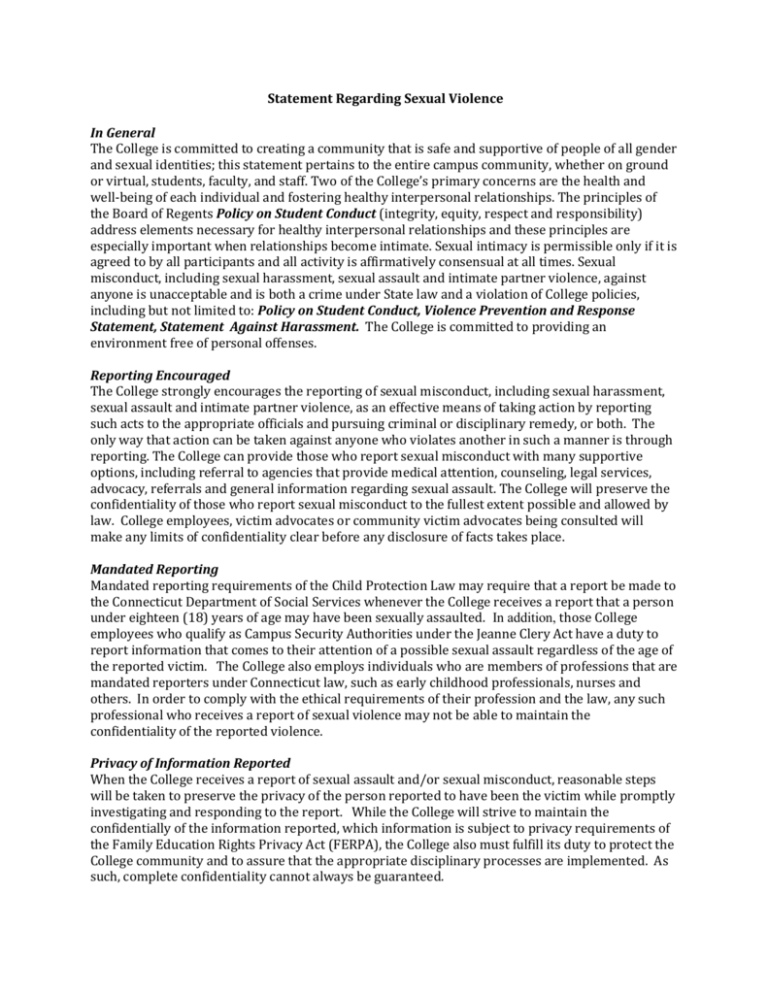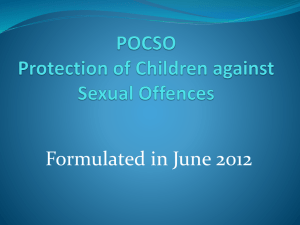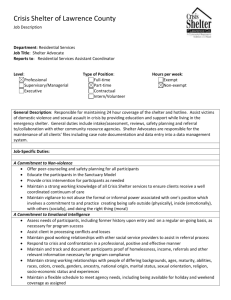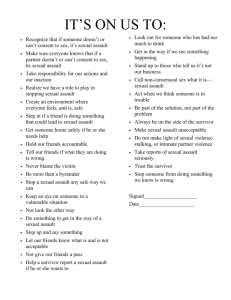
Statement Regarding Sexual Violence
In General
The College is committed to creating a community that is safe and supportive of people of all gender
and sexual identities; this statement pertains to the entire campus community, whether on ground
or virtual, students, faculty, and staff. Two of the College’s primary concerns are the health and
well-being of each individual and fostering healthy interpersonal relationships. The principles of
the Board of Regents Policy on Student Conduct (integrity, equity, respect and responsibility)
address elements necessary for healthy interpersonal relationships and these principles are
especially important when relationships become intimate. Sexual intimacy is permissible only if it is
agreed to by all participants and all activity is affirmatively consensual at all times. Sexual
misconduct, including sexual harassment, sexual assault and intimate partner violence, against
anyone is unacceptable and is both a crime under State law and a violation of College policies,
including but not limited to: Policy on Student Conduct, Violence Prevention and Response
Statement, Statement Against Harassment. The College is committed to providing an
environment free of personal offenses.
Reporting Encouraged
The College strongly encourages the reporting of sexual misconduct, including sexual harassment,
sexual assault and intimate partner violence, as an effective means of taking action by reporting
such acts to the appropriate officials and pursuing criminal or disciplinary remedy, or both. The
only way that action can be taken against anyone who violates another in such a manner is through
reporting. The College can provide those who report sexual misconduct with many supportive
options, including referral to agencies that provide medical attention, counseling, legal services,
advocacy, referrals and general information regarding sexual assault. The College will preserve the
confidentiality of those who report sexual misconduct to the fullest extent possible and allowed by
law. College employees, victim advocates or community victim advocates being consulted will
make any limits of confidentiality clear before any disclosure of facts takes place.
Mandated Reporting
Mandated reporting requirements of the Child Protection Law may require that a report be made to
the Connecticut Department of Social Services whenever the College receives a report that a person
under eighteen (18) years of age may have been sexually assaulted. In addition, those College
employees who qualify as Campus Security Authorities under the Jeanne Clery Act have a duty to
report information that comes to their attention of a possible sexual assault regardless of the age of
the reported victim. The College also employs individuals who are members of professions that are
mandated reporters under Connecticut law, such as early childhood professionals, nurses and
others. In order to comply with the ethical requirements of their profession and the law, any such
professional who receives a report of sexual violence may not be able to maintain the
confidentiality of the reported violence.
Privacy of Information Reported
When the College receives a report of sexual assault and/or sexual misconduct, reasonable steps
will be taken to preserve the privacy of the person reported to have been the victim while promptly
investigating and responding to the report. While the College will strive to maintain the
confidentially of the information reported, which information is subject to privacy requirements of
the Family Education Rights Privacy Act (FERPA), the College also must fulfill its duty to protect the
College community and to assure that the appropriate disciplinary processes are implemented. As
such, complete confidentiality cannot always be guaranteed.
Confidential resources, such as off campus counseling and psychological services, health services
providers, member(s) of the clergy, and the local Sexual Assault Crisis Center are bound by state
statutes and professional ethics from disclosing information about reports without written
releases. Information that such persons receive from the reporter of a sexual assault or the person
reported to have been assaulted cannot be disclosed legally to any other person without consent,
except under very limited circumstances, such as an imminent threat of danger to self or others or if
the reported victim is a minor. Therefore, for those who wish to obtain the fullest legal protections
and disclose in full confidentiality, s/he must speak with a full confidential resource. The following
is a partial list of such confidential resources in the College’s service region:
The Center for Women and Families, Bridgeport (20) 384-9559
Women’s Center of Greater Danbury (203) 731-5204
Women and Families Center, New haven (203) 235-4444
Center for Sexual Assault Crisis, Stamford (203) 348-9346
Adult Survivors of Child Abuse, Norwalk (203) 348-9346
Where it is deemed necessary for the College to take steps to protect the safety of the reported
victim and/or other members of the College community, the College will seek to act in a manner so
as not compromise the privacy or confidentiality of the person reported to be a victim of a sexual
assault to the extent reasonably possible.
Rights and Options of Those Who Report
Those who report any type of sexual misconduct, including sexual harassment, sexual assault or
intimate partner violence, to a College employee will be informed in a timely manner of all their
rights and options, including the necessary steps and potential outcomes of each option. When
choosing a reporting resource the following information should be considered:
All reports of sexual misconduct, including sexual harassment, sexual assault and intimate
partner violence, will be treated seriously and with dignity by the College.
Referrals to off-campus counseling and medical services that are available immediately and
confidentially, whether or not those who report an assault feel ready to make any decisions
about reporting the assault to police, the Dean of Students or the College’s Title IX
Coordinator.
Those who have been assaulted have the right to take both legal action (criminal/civil
action) and action in accordance with the Policy on Student Conduct and Policy Against
Harassment against the individual allegedly responsible.
Those who may wish that her/his report of an assault to be handled in a confidential
manner may contact the Center for Sexual Assault Crisis, Stamford (203) 348-9346 − bound
by state statutes and professional ethics to maintain confidentiality without written
releases.
Options for Changing Academic, Transportation and Working Arrangements
Housatonic Community College will provide assistance to those involved in a report of sexual
harassment, sexual assault or intimate partner violence, including but not limited to, reasonably
available options for changing academic, campus transportation or working situations as well as
honoring lawful protective or temporary restraining orders.
The procedures to follow after the commission of such violence, including people or
agencies to contact for reporting purposes or to request assistance, and
information on the importance of preserving physical evidence;
Housatonic’s Office of Public Safety (203) 332-5025
Connecticut State Police (203) 696-2500
Bridgeport Police Department (203) 576-7671
Agency Contact Information
It is the Practice of the College that whenever the College’s Title IX Coordinator or other employee
receives a report that a student, faculty or staff member has been subjected to sexual misconduct,
including sexual harassment, sexual assault or intimate partner violence, the College’s Title IX
Coordinator or other employee shall immediately provide student, faculty or staff member with
contact information for and, if requested, professional assistance in accessing and using campus,
local advocacy, counseling, health, and mental health services. The following list of services,
including contact information, is provided for this purpose:
The Center for Women and Families, Bridgeport (203) 384-9559
Women’s Center of Greater Danbury (203) 731-5204
Women and Families Center, New haven (203) 235-4444
Center for Sexual Assault Crisis, Stamford (203) 348-9346
Adult Survivors of Child Abuse, Norwalk (203) 348-9346
Housatonic Department of Public Safety (203) 332-5025
Bridgeport Center for Women & Children (203) 333-2233
St. Vincent’s Medical Center (203) 576-5171
Connecticut Sexual Assault Crisis Services 1-888-999-5545
Bridgeport Hospital 1-888-357-2396
Connecticut Office of Victim Services 1-800-822-8428
Right to Notify Law Enforcement & Seek Protective and Other Orders
Those who report being subjected to sexual misconduct, including harassment, sexual assault or
intimate partner violence, shall be provided written information about her/his right to:
(1) notify law enforcement and receive assistance from campus authorities in making the
notification; and,
(2) obtain a protective order, apply for a temporary restraining order or seek enforcement of an
existing order. Such orders include:
- standing criminal protective orders;
- protective orders issued in cases of stalking, harassment, sexual assault, or risk of injury to or
impairing the morals of a child;
- temporary restraining orders or protective orders prohibiting the harassment of a witness;
- relief from physical abuse by a family or household member or person in a dating relationship;
and
- family violence protective orders.
Information pertaining to how to apply for a restraining is available at:
http://jud.ct.gov/Publications/fm142.pdf as well as through the Office for Victim Services.
In addition, the Office of Victim Services (OVS), Connecticut Judicial Branch, is the state's lead
agency established to provide services to victims of violent crime. For further information,
including contact information for the OVS, see: http://jud.ct.gov/crimevictim/index.html or call 1800-822-8428.
Students should be aware that under Connecticut law (Public Act 12-114, entitled An Act
Concerning Domestic Violence) that became effective on October 1, 2012, among other provisions,
requires clerks of court, upon request of the protected person, to send notice of a protective order
to the President and the special police force, if any, at the College or University at which the victim
is enrolled. The full text of the statute can be found at:
http://www.cga.ct.gov/2012/ACT/PA/2012PA-00114-R00HB-05548-PA.htm
Student Conduct Procedures
The Board of Regents Policy on Student Conduct provides the procedures for the investigation
and resolution of complaints regarding student conduct, including those involving sexual
harassment, sexual assault and intimate partner violence.
The College’s Dean of Students or Title IX Coordinator can assist in explaining the student conduct
process. The Dean of Students, Title IX Coordinator or designee are the designated recipients of
reports of violations of the Expectations for Student Conduct set forth in the Policy on Student
Conduct. The Dean of Students also administers the Policy on Student Conduct process regarding
any such reports. The Policy on Student Conduct provides an equal, fair, and timely process
(informal administrative resolution or a formal adjudication) for complainants and accused
students.
Time to Report
To summarize the procedures, normally reports must be received by the Dean of Students or other
designee of the President Director of Public Safety, Master Sergeant Chris Gough ( 203) 332-5024
within thirty (30) days of the date of a possible violation or within thirty (30) days of the date the
facts constituting a possible violation were known. However, the College recognizes that the
decision to file a report of sexual misconduct or relationship violence is difficult and may take some
time. Because memories may fade and witnesses may become inaccessible, the sooner information
is gathered, the greater is the ability of the College to effectively investigate and resolve the matter
fairly to all parties concerned.
Danger to Persons, Property or Academic Process: Interim Suspension or Restriction
Upon receipt of a report, the Dean must initially determine if, based upon the reported incident, the
continued presence of the reported violator would constitute an unreasonable danger to the
persons, property or academic process of the College. If the Dean so determines, the Dean is
authorized to suspend or restrict the reported violator on an interim basis.
Investigation
The Dean is expected to conduct a thorough and impartial investigation into the report and, upon
the conclusion of the investigation, the Dean must decide whether the information gathered leads
to the conclusion that the reported student committed the reported violation.
Range of Sanctions
The Policy on Student Conduct provides sanctions for any violation of the Policy that range from a
warning to separation from the College depending on the severity and the extent of the behavior,
among other factors. The purpose of sanctions includes, but is not limited to: changing student
behavior, protecting the College community from further violations and fostering a campus
environment that is conducive to learning, teaching and working.
Upon the conclusion of the investigation, the Dean must determine whether or not the sanction for
the violation involves suspension or expulsion from the College.
Violation Not Warranting Suspension or Expulsion
If the Dean determines the violation does not warrant suspension or expulsion from the
College, then the Dean is expected to conduct an Administrative Conference and decide,
after informing the accused student of the results of the investigation and after providing
the accused student with an opportunity to provide additional information, whether a
violation has occurred and, if so, what sanction not involving suspension or expulsion is
appropriate. There is no right of review from such a decision of the Dean.
Violation Warranting Suspension or Expulsion: Resolution Options
If upon the completion of the investigation the Dean determines that the reported student
has violated the Expectations for Student Conduct and that suspension or expulsion is
warranted, the Dean shall offer the accused student a statement of the results of the
investigation, a proposed agreement in lieu of a hearing and a statement of the student’s
rights at a hearing should there be a hearing.
Rights of Both the Reported Victim and the Accused
Additionally, both the reported victim and the accused student are entitled to the following:
- to be accompanied to any meeting or proceeding by an advisor or support person of their choice,
provided that the advisor or support person does not cause a scheduled meeting to be delayed or
postponed;
- to request that student conduct proceedings begin promptly;
- to have student conduct proceedings be conducted by an official trained in issues relating to
sexual assault and intimate partner violence;
- to present information, including other persons, on their behalf;
- to have the student conduct proceedings use the more likely than not standard in determining
whether a violation of the Expectations for Student Conduct has been committed, i. e. , whether it is
more likely than not that the reported act of sexual misconduct, including sexual harassment,
sexual assault or intimate partner violence, was committed by the accused student.
- to be informed in writing of the results of the proceeding as soon as possible after it concludes,
normally no later than the next business day after it concludes; and
- consistent with the requirements of the Family Educational Rights and Privacy Act (FERPA) and
other federal and State laws, have their identities kept confidential.
Key Definitions
Sexual assault is defined to mean first, second, third and fourth degree sexual assault as well as
aggravated first degree sexual assault and third degree sexual assault with a firearm as more
specifically defined in Connecticut State law.
Sexual Misconduct is defined as:
Non-consensual sexual intercourse, which includes any sexual intercourse (anal, oral, or
vaginal), however slight, with any body part or object, by a man or a woman, without
effective consent.
Non-consensual sexual contact, which includes sexual touching, however slight, with any
object, by a man or a woman, without effective consent.
Sexual exploitation, which includes non-consensual, unjust or abusive sexual advantage
taken by a student of another, for his or her own advantage or benefit, or to benefit or
advantage anyone other than the one being exploited, and that behavior does not otherwise
constitute non-consensual sexual intercourse, non-consensual sexual contact or sexual
harassment. Examples of sexual exploitation include, but are not limited to: prostitution,
videotaping consensual sex without a partner’s consent, peeping tommery and knowingly
transmitting sexually transmitted infections without a partner’s knowledge.
Consent is defined as informed, freely and actively given assent, involving an understandable
exchange of affirmative words or actions, which indicates a willingness to participate in mutually
agreed upon sexual activity. It is the responsibility of the initiator to obtain clear and affirmative
responses at each stage of sexual involvement. The lack of a negative response is not consent.
Consent may not be given by a minor or by any individual who is incapacitated, whether voluntarily
or involuntarily, by drugs and/or alcohol. Past consent of sexual activities does not imply ongoing
future consent.
Stalking is defined as any behaviors or activities occurring on more than one (1) occasion that
collectively instill fear in the victim and/or threaten her/his safety, mental health and/or physical
health. Such behaviors or activities may include, but are not limited to, whether on or off campus,
non-consensual communications (face to face, telephone, e-mail, etc.), threatening or obscene
gestures, surveillance or being present outside the victim’s classroom or workplace.
Relationship violence is defined as:
Including intimate partner violence, which is any physical or sexual harm against an
individual by a current or former spouse or by a partner in a dating relationship that results
from (1) sexual assault; (2) sexual assault in a spousal or cohabiting relationship; and (3)
domestic violence (which includes various crimes) and first, second, and third degree
stalking as more specifically defined in Connecticut State law.
Physical abuse, which can include but is not limited to, slapping, pulling hair or punching.
Threat of abuse, which can include but is not limited to, threatening to hit, harm or use a
weapon on another (whether victim or acquaintance, friend or family member of the victim)
or other forms of verbal threat.
Emotional abuse, which can include but is not limited to, damage to one’s property, driving
recklessly to scare someone, name calling, threatening to hurt one’s family members or pets
and humiliating another person.
Sexual harassment, which can include any unwelcome sexual advance or request for sexual
favors, or any conduct of a sexual nature when submission to such conduct is made either
explicitly or implicitly a term or condition of an individual’s education; submission to or
rejection of such conduct by an individual is used as a basis for academic decisions affecting
the individual; or such conduct has the purpose or effect of substantially interfering with an
individual’s academic performance or creating an intimidating, hostile or offensive
educational environment. Examples of conduct which may constitute sexual harassment
include but are not limited to:
sexual flirtation, touching, advances or propositions
verbal abuse of a sexual nature
pressure to engage in sexual activity
graphic or suggestive comments about an individual’s dress or appearance
use of sexually degrading words to describe an individual
display of sexually suggestive objects, pictures or photographs
sexual jokes
stereotypic comments based upon gender
threats, demands or suggestions that retention of one’s educational status is
contingent upon toleration of or acquiescence in sexual advances.
RESOURCES
A variety of support resources are available on campus and in the community to assist in dealing
with sexual violence. These resources are available whether or not the incident occurred on campus
or off campus.
The College and community partners provide a range of services, resources, and mechanisms. In
all cases, the choice may begin with an exploratory conversation. Making contact does not obligate
anyone to utilize services or make any report.
For support and information on available options contacting any of the following is encouraged:
Housatonic’s Office of Public Safety (203) 332-5025
Housatonic’s Women’s Center (203) 332-5268
Housatonic’s Counseling Center (203) 332-5097
Dean of Students Office (203) 332-5184
Additional Resources (Available 24 hours a day, 7 days a week)
The Center for Women and Families, Bridgeport (20) 384-9559
Women’s Center of Greater Danbury (203) 731-5204
Women and Families Center, New haven (203) 235-4444
Center for Sexual Assault Crisis, Stamford (203) 348-9346
Adult Survivors of Child Abuse, Norwalk (203) 348-9346
Adult Survivors of Child Abuse, Norwalk (203) 348-9346
Housatonic Department of Public Safety (203) 332-5025
Bridgeport Center for Women & Children (203) 333-2233
St. Vincent’s Medical Center (203) 576-5171
Connecticut Sexual Assault Crisis Services 1-888-999-5545
Bridgeport Hospital 1-888-357-2396
Connecticut Office of Victim Services 1-800-822-8428
SEXUAL ASSAULT AWARENESS & EDUCATION
Training is planned for faculty, staff members, and administrators. Each entering student will be
given an emergency sexual assault notification card that explains available services for victims of
sexual assault, as well as the immediate response role of College personnel.
CONCLUSION
All members of the College community share a responsibility for upholding this practice as we
strive to attain our goal of creating a community that is safe and free of violence.








